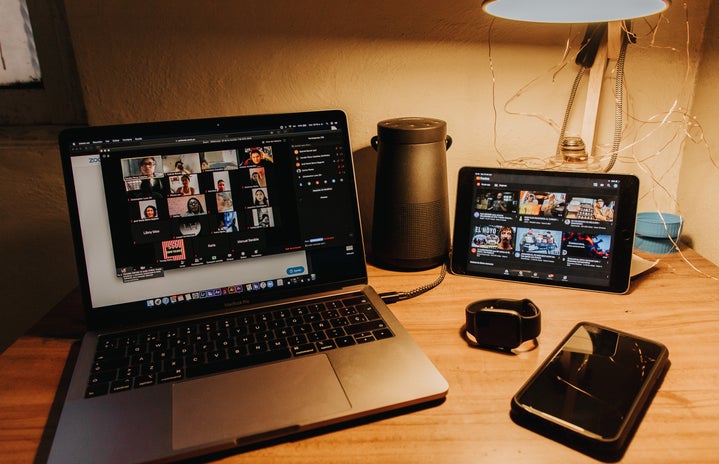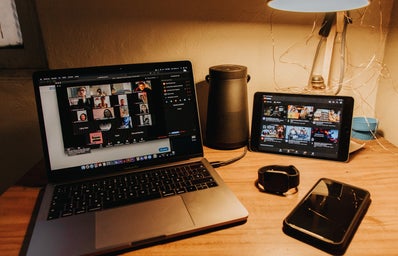Online learning via university
It’s officially been six months since the COVID-19 lockdown began, sparking the beginning of a new era. For Ryerson students, the idea of sitting on the SLC steps come September with coffees in hand will be a vague memory from the past. On May 14, 2020, President and Vice-Chancellor Mohammed Lachemi announced the switchover from in-person classes to virtual learning at Ryerson University. Many other universities across Canada and the US followed suit, keeping the majority of learning online with some exceptions for in-person labs and smaller class sizes, depending on the location of the school and size of the program.
The unfortunate reality is that most [students] won’t be able to step foot on their campus for a while. For those who desperately need a library-esque atmosphere, their studies might be jeopardized. Some, however, feel that online learning is the safest and most effective way to work through this challenging Fall semester.
Humber College student Ryan Linton is concerned for his studies, saying, “I have [ADHD], so I’m concerned I’ll have trouble focusing during online lectures and keeping up with due dates, not to mention how difficult it will be to stay motivated. Part of the learning experience is being in flesh, in a classroom. Placement requirements [for my program] were altered earlier in the year to be completed in the form of assignments. What use is that to us? Real world experience replaced by written essays is not the tradeoff any of us intended.”
Virtual learning is not possible for all students in all programs. It limits any type of feedback or engagement and there is an intense requirement for self-discipline that not everyone is able to do. I don’t know about you, but during my six-hour journalism workshops, I need to be involved, or else I practically fall asleep!
I spoke with Wilfrid Laurier student, Sofia Mironova about her experience in the Business Administration (BBA) program. The BBA program rotates semesters between co-op opportunities and class time. This summer, Mironova had a full course load and explained to me how each professor works differently.
“I study best on campus with a group of people. So we can write on whiteboards and talk out problems. [Online] learning depends on how the course was offered. Some of my courses were recorded lectures, which are good for people who like to pause/play lectures back to take detailed notes. Two of my [BBA] courses were online lectures, through Zoom, which were absolute hell. As for midterms and exams, a lot of people were definitely tempted to cheat, so that could have really bad effects on a students’ study pattern and integrity. Overall, if I could have, I would have deferred a semester, because my GPA definitely went down, and virtual learning is a pain. However, it’s not like we had a choice with this pandemic.”
Tuition costs versus health & safety: A debate
Shortly after Lachemi announced that the Fall semester would be online, he also announced that tuition costs would remain the same. As a journalism student, Ryerson University provided us with access to many softwares and so much equipment we won’t be able to use from home, as well as access to the Venn, a journalism-specific lounge. Many other FCAD programs are in the same boat, not to mention the other students and parents who are angry about the tuition costs remaining the same.
Ryerson University student Maria Mccollum shares where her priorities lie: “Ryerson is located in such a high density area; offering services online is a necessity. The priority right now has to be health and safety. I do understand the frustration about paying full fees while not having access [to them] however students need to understand that many universities will barely break even this year. Many international students cannot attend this year, students are opting out, and there is increased cleaning staff among other factors. If paying regular tuition and sacrificing certain services is the cost for the longevity of my university, then I am 100 per cent okay with paying normal fees.”
However, Ryerson University student Camilla Bains shares her frustrations with the tuition cost: “I think this shows just how much the university values their student body. In the middle of a pandemic, when most are struggling to make money, I think it just shows how business-oriented and money-minding our school is, which is upsetting.”
Rose Francella, mother of three, speaks up about life at home during the COVID-19 pandemic: “Considering we’ve all been at home quite a bit, our house expenses have gone up considerably. We have been using [more] electricity and water. How can they justify the cost of tuition when the majority of buildings will only be used a fraction of the time and with none to very few students at a time?”
According to an article published by CTV News, many schools claimed to have been operating on ‘thin margins’ even before the COVID-19 pandemic, which is why they can’t sacrifice any revenue at all this upcoming school year. They’re also increasing their spendings to allow for online learning to be at a greater level for the Fall, so that students get the education they need in the best possible way, in order to succeed.
Ontario’s public school plan
Although it seems likely that universities have a set plan, public schools are doing things differently. For the first time, Ontario families have been told that in-person instruction will be voluntary for the upcoming school year. This is to allow parents to reach decisions that work for both them and their children. According to Ontario.ca, adapted curriculums, smaller and specific class sizes, and alternating days are all possible approaches to schooling during the COVID-19 pandemic.
High school student, Jackson Miller, thinks that any in-person schooling could be an issue. “Old habits die hard, and once students see each other for the first time again, they will want to hug and do their handshakes. It’ll also be hard to hold classroom discussions if we’re wearing masks all day.”
High school student, Lily Ferreira, would prefer her schooling to be online, however, saying, “I don’t know where my classmates have been or who they’ve been around. I don’t want to put myself at risk, not to mention wearing a mask in a classroom would be a huge distraction for me.”
Some school boards, such as the Peel District School Board, have begun sending out “Return-to-school” surveys for families, asking them what their preferred method of teaching would be: Fully online, fully in-class learning, or split. This works to make sure that everyone is involved in the important decision, which could ultimately make or break the future of education at their child’s expense.
Although students clearly have their opinion about the future of learning, it is also important not to neglect teachers and parents. I had the privilege of interviewing Samantha Ashe, Elementary School Teacher for the Waterloo Region District Schoolboard (WRDSB). She mentioned, “I’m [anxious] about going back to school. I’m frustrated that students are the government’s guinea pigs. As schools open, government offices stay closed. It’s not fair to ask them to be so socially responsible; they’re kids, but unfortunately, a small mistake can really mess up many lives.”
What does this mean for the future?
I’m sure we can all agree that in the last six months, a lot has changed. The new normal that has taken over the world, with socially distanced patio drinks, masks in public spaces, and temperature checks at the door. This was something that no one could have anticipated. I’m not sure if there’s any way to predict how successful the online semester will be, nor can we predict a second wave of COVID-19.
“I definitely didn’t see all of this coming, I’m sure none of us did. Education has had to make some drastic changes, but the real question is, what kind of impact will this [pandemic] have on the way we learn in the long run?” says Ryerson student Anastasiya Romanska.
When asked about the future of learning, Brock alumni student Lauren Luciani thinks that COVID-19 will shape a different style of education. “I’m not saying schools will completely change because of the pandemic; for the time being, we had no choice but to adapt to safer measures of learning. However, teaching can change in the blink of an eye. When I was in grade school we learnt by using a pen and paper, and now we have the technology to do way more things. I honestly think anything is possible, we just have to see how it goes.”
So let that be known, that although there are many mixed opinions about the future of the school system, we have to take it one day at a time. Until then, we’ll be preparing for the Fall semester from the four walls of our bedrooms, doing our best to stay positive and keep that GPA up, no matter how hard it might be. Here’s hoping we can return to a new normal come January.



